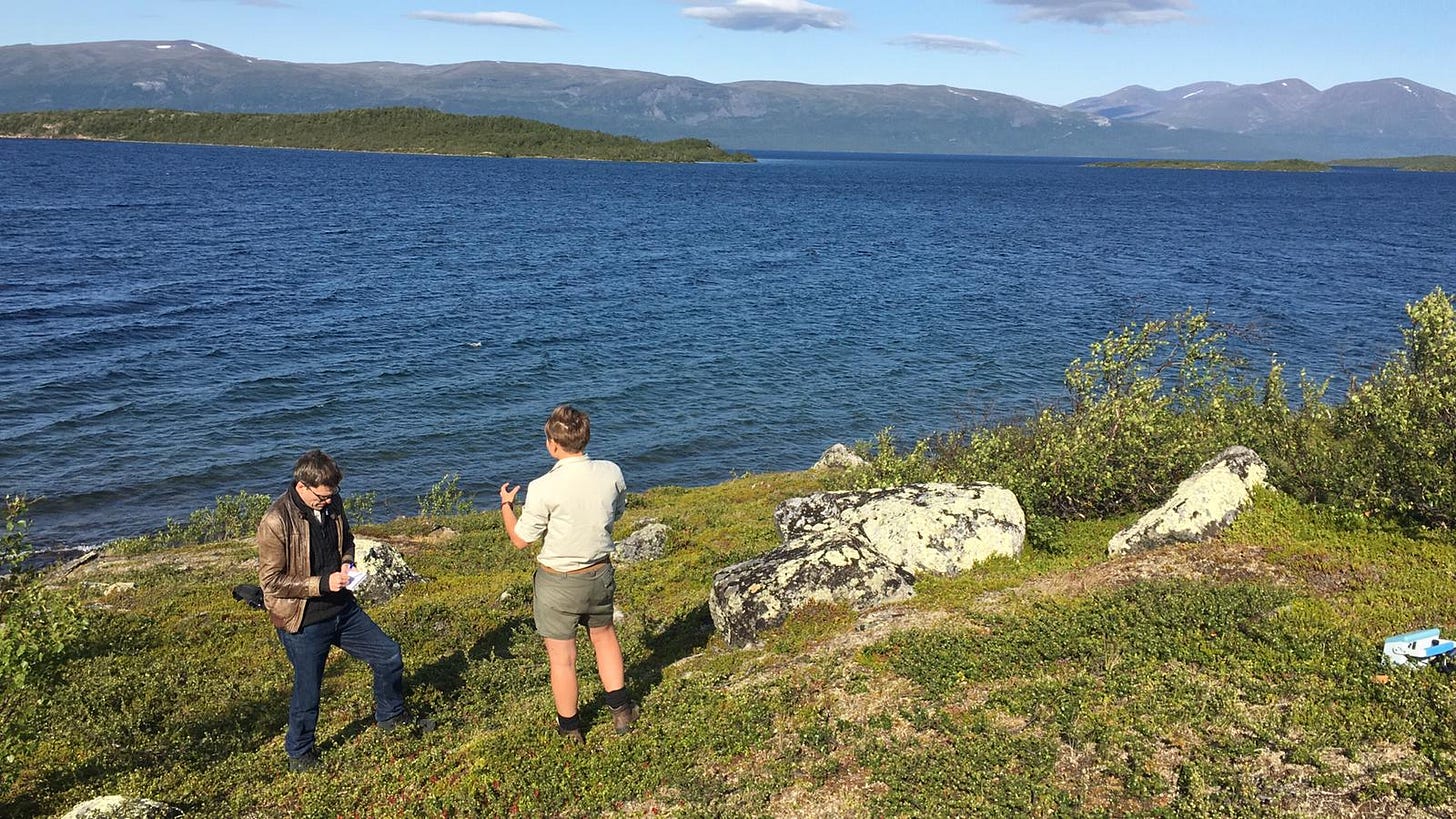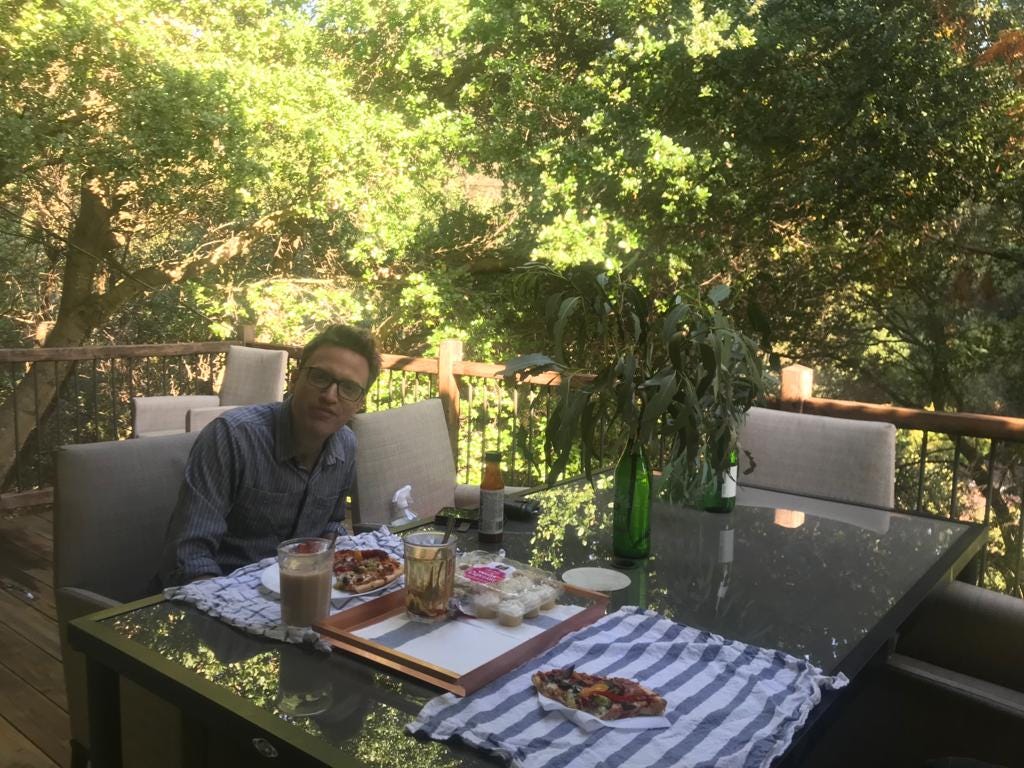"Climate Trauma"
Zhiwa Woodbury's visionary thinking throws the crisis into a new light.
Resonant World #1
When I first heard the temperature in the UK was going to hit a record 40 Celcius last month, part of me felt a wash of relief. Finally, it seemed, there could be no more pretending that the climate crisis wasn’t real, here and a threat to everything we love.
Living in denial takes a toll. That’s true for individuals. And it’s true at the collective level as well.
There’s a baseline psychic cost to participating in any system that invests so much energy in turning away from the truth of what’s gone wrong, and how much will need to change.
That means that when the shield of denial splinters, a lot of stuck energy can start to move.
At first that can show up as feelings of dread, anxiety and disorientation. But splintering also creates space. A sense of clarity, connection and resolve can arise once all that suppressed fear is finally faced, and fully felt.
This kind of transmutation isn’t easy. In my experience, it’s best done in community. And facilitating this process — anywhere and everywhere it’s needed — is what healing collective trauma is all about.
“Islands of sanctity”
Back in 2019, when I’d just started as climate correspondent for Reuters, somebody suggested I propose a support group for fellow journalists who also spent their days peering into the climate abyss.
It never got off the ground.
That changed when lockdown hit. Suddenly, people needed to come together and explore their responses to the pandemic. About a dozen friends and colleagues gathered for 90-minute Zoom calls every week for 11 straight weeks. Expertly co-facilitated by my friends Zhiwa Woodbury (more on his work below) and Dallas Gudgell, these evening sessions served as “islands of sanctity” — to borrow Extinction Rebellion co-founder Skeena Rathor’s phrase. Most of us hadn’t been fully focused on the climate crisis. But the pandemic triggered an impulse to bear witness to each other’s experiences that would never have emerged during “normal” times.
Since we’re not going back to “normal,” we’re going to need more islands.
Weaving threads
One of the core aims of Resonant World is to explore what an understanding of collective trauma can tell us about the climate and ecological crisis — and vice-versa.
On a personal level, this represents my attempt to braid two major strands of my professional life: the years I spent writing about war trauma after returning from a long stint overseas; and my more recent reporting on the climate.
There’s a phrase sometimes used in the climate movement to help people who are waking up to the scale of the crisis and asking themselves what they can do: “Pick up the threads that are yours to weave.” These feel like my threads.
Though “threads” doesn’t quite do the task justice. Climate change and collective trauma can perhaps better be understood as “hyperobjects” — to borrow Timothy Morton’s phrase — phenomena distributed across vast reaches of space and time, that have the power to fundamentally change our reality, and our understanding of our place in the world. The hyperobjects of climate change and collective trauma are smashing together all the time, all around us — and within our nervous systems, organs and cells. It’s one story — and it’s eight billion stories — unfolding all at once.
Fortunately, I found a guide.
“Climate Trauma”
There’s no one boiler-plate way to introduce Zhiwa.
Public interest attorney. Quantum ecopsychologist. Climate activist. Tibetan Buddhist. Fierce advocate for Gaia. Zen hospice practitioner. Space-holder, interpreter of dreams, writer and the only person I know to have seriously contemplated a career as a mendicant monk.
In my experience, Zhiwa (his given dharma name, meaning “nirvana's peace”) is as much a place as a person — somewhere you can go to feel an almost tangible quality of wise, loving kindness as soon as the call begins. And perhaps it’s this core vibration that makes his writing so compelling.
I first learned about Zhiwa’s work in early 2019, after stumbling upon his now seminal paper Climate Trauma: Towards A New Taxonomy of Trauma.
The term “climate trauma” had been used before — notably by Sheila Watt-Cloutier, in a TEDx talk linking the suffering of Indigenous peoples to the degradation of the global climate. But Zhiwa elaborated the concept further. Since I can only offer a bare-bones summary here, I highly recommend reading the eight-page paper, and a follow-up this year called Becoming Indigenous To Earth. (And, if you’ve got time, hear from Zhiwa himself in this podcast we recorded a while back).
We first met remotely, and then in person, later in 2019, when I stayed with a friend in Oakland en route to a climate conference at the Occidental Arts & Ecology Center in Sonoma County — my first and only trip to California. Zhiwa led me on a mini-pilgrimage to the California Institute of Integral Studies — a “compassionate think-tank”, he calls it — where mentors from the fields of ecopsychology, spiritual counselling and Asian studies helped refine his thinking on climate.
Symptoms vs disease
Zhiwa argues that mainstream psychology has faltered in its response to climate change by focusing mostly on how hurricanes, droughts or other disasters affect people’s mental health.
That misses the point, Zhiwa writes:
“Are we conflating symptoms and disease here? What if, rather than thinking of trauma as being a potential symptom of episodic events associated with climate change…climate change itself were to be considered as a new, superordinate form of trauma?”
So climate change is actually an entirely novel form of trauma — so massive and all-encompassing that humans have never encountered anything like it.
That marks a departure from previous understandings of collective trauma.
Implicit in collective trauma work is the recognition that groups can suffer “cultural trauma” — a shocking wounding of the collective psyche that changes a community, or nation’s, identity in fundamental ways. Examples in American history could include the assassinations of Martin Luther King and John F. Kennedy in the 1960s, or the September 11, 2001 attacks on the Twin Towers, to name a few.
But Climate Trauma is something of an entirely different order. It’ s not an event — but a continually occurring reality unfolding in real time, bringing life as we’ve always known it crashing down, and simultaneously shaping a new, foreign future. The scale of the destruction man-made warming is causing, and will cause, isn’t only affecting every culture on Earth — it’s changing the very definition of what it means to be human.
Safety and relation
The concept of Climate Trauma makes the industrialised world’s seeming paralysis in the face of the imperative to cut greenhouse gas emissions much easier to understand. Just as individuals cope with overwhelming traumas by avoidance, going numb or dissociating, Climate Trauma is triggering an equivalent reaction — only on a planetary scale.
And that’s good news — in a sense. Because we know a lot about what it takes to heal trauma on an individual level, Zhiwa argues, we should, in theory, be able to apply the same principles to healing trauma on a planetary level as well.
The core ingredient of healing is establishing a deeply felt experience of safety. Only then can the body begin to release the emotions pushed down inside at the time of the trauma. When those stuck, stagnant emotions start to shift, the constricted thought patterns associated with the trauma can also change. The past loses its grip on the present, and we’re free to express new, more spontaneous ways of being in the world.
It follows that if we’re going to heal our Climate Trauma, we need to come together to acknowledge the feelings of helplessness, shame, fear and grief we’re holding — and tap into the wisdom that lies on the other side. Zhiwa believes that a sufficient concentration of these kinds of small- and large-group processes have the potential to catalyse the kind of rapid social change that nobody saw coming — the collapse of the Berlin Wall and the Soviet Union, or the Arab Spring, for example. He writes:
“We should never underestimate the power of individual awareness to promote healing, freeing up latent energies, or the power of shared awareness to transform social structures.”
That’s what first inspired me to write about Extinction Rebellion — the group seemed to provide a refuge from the cognitive dissonance of living in a society that was still so deeply in denial about the scale of the emergency. The movement functioned as a kind of living alchemical retort where you could bring your grief, your heartbreak and your anxiety — and transform it into political action.

That’s by no means the only model for this work. This week I just happened to see a notice for a four-day, donation-based retreat in the southern English county of Hertfordshire supporting people waking up to the climate and ecological emergency. And then I came across a reference on Jem Bendell’s page to a movement of climate-informed coaches. There are thousands of initiatives like these springing up around the world — including the Collective Trauma Summit 2022 (details below). I’d love to hear about any others you’ve come across in the comments). Zhiwa himself is now working full time to implement ecological restoration at scale utilizing Indigenous resources and keystone species, notably the wild bison of Yellowstone National Park.
So far, such initiatives are all but invisible to the legacy media, bar the odd feature. Viewed as a whole, they form part of the global immune system that is emerging in response to our interlocking crises. We need as much coverage as possible of the shriveled up rivers, devastated crops, and forest fires marking this grim European summer. We also need a clearer understanding of our collective capacity to heal.
Preview of the Collective Trauma Summit 2022
I’ll be taking part in a webinar to preview the summit (which runs from Sept. 28-Oct 6) with Thomas Hübl and other co-hosts on Wednesday, August 24 at 0900am LA / 12pm NY / and 5pm London. You can register for this preview for free here.







